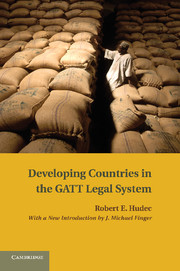PART II - A LEGAL CRITIQUE OF THE GATT'S CURRENT POLICY
Published online by Cambridge University Press: 03 May 2011
Summary
INTRODUCTION
THE HISTORY of the GATT's legal relationship with developing countries points to one major question throughout. Is the current GATT legal policy in the best interest of the developing countries themselves, or would developing countries achieve better results if they were to agree to a legal policy based on the GATT's two main principles of reciprocity and non-discrimination?
This question has been debated ever since 1947. It is still being debated today. Despite the GATT's repeated formal endorsement of the principle of non-reciprocal and preferential treatment, opposition to that principle is probably greater today than at any other time. The governments of developed countries sign the declarations, but they do not believe in what they are doing. A growing number of governments in developing countries have doubts. And commentators, especially those from developed countries, become more critical every year.
The disagreement has a paralyzing effect on GATT reform. All participants agree that the GATT system has been losing ground since the mid-1970s and that it needs to move forward in order to regain its effectiveness. On matters of policy towards developing countries, however, the GATT membership finds itself pulling in opposite directions, with one group of countries calling for extension of the current policy while another group asks that it be discarded as a failure.
- Type
- Chapter
- Information
- Developing Countries in the GATT Legal System , pp. 115 - 117Publisher: Cambridge University PressPrint publication year: 2010



